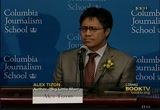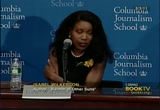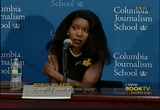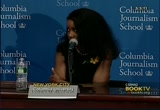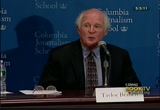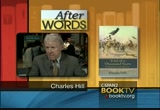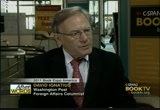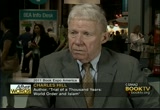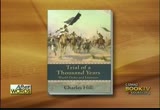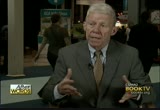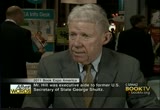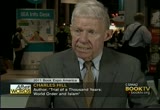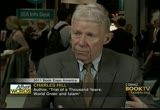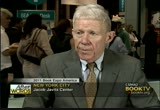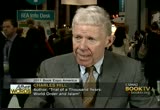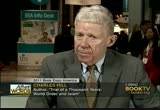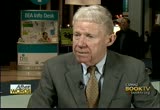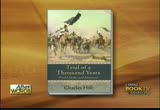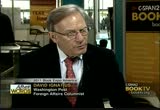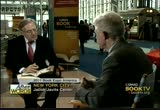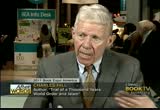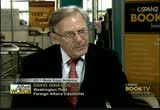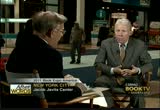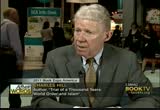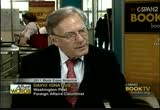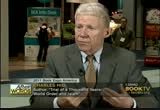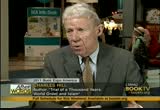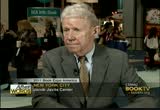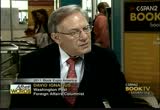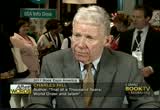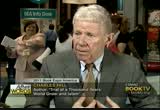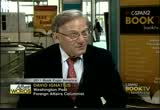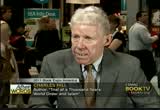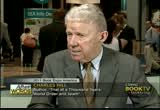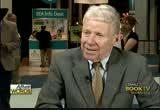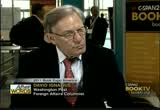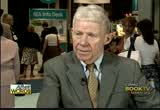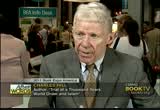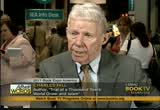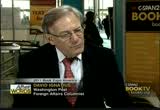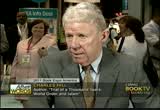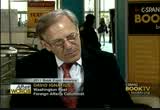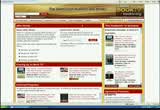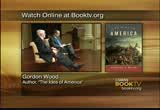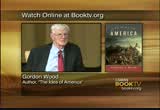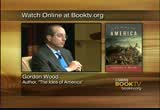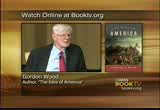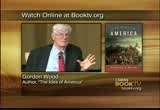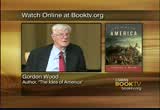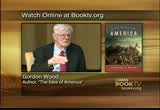tv Book TV CSPAN July 17, 2011 12:00pm-1:00pm EDT
12:00 pm
12:01 pm
>> there's also the back story and history of 100 years from reconstruction until eventually the beginning of the 21st century. there was a lot to be done. you know, throughout history writers have found a way to make it work. it shouldn't be this hard. there should be greater appreciation for the work that goes into it. there should be a greater appreciation by the culture in general, what goes into nonfiction because these are real people. this took a tremendous amount of resources in order to travel to these places to see them, and to arrive from halfway across the country and find i can't even talk to the person because the person is in the hospital. once i came to new york and mike
12:02 pm
was in a coma. so this is tremendous amount of resources that are necessary in order to do it to a certain level. and yet if you have that sense of ambition, which is as good provided by tony lucas, then you do what you must. he taught at boston university. i've taught at multiple universities. i've taught at princeton, emory, boston university. and so you do which have to do for the work, and you hope that it will find a readership and will find an audience. that's the ultimate fulfillment of the work. >> can you both recommend this kind of work to other writers, given all, what you are saying is, what you both said is these are books you had to write, but you do consider it an art and a calling and you have to do it. i survey felt the same way. i would recommend, i would
12:03 pm
recommend it to any writer, provided you feel that way about it. you have to feel very strongly. what do you think? >> yeah, absolutely. i think that being a writer, it's not a total privilege. you have to live in tinsley, especially when you're writing about the kind of issues that isabel is writing about the issues i am writing about. there's a saying i just read, live to the point of tears. i forget who said that. live to the point of tears. and to be a writer you have to constantly be on the point of tears. and to me that's the only way to live. not just tears of sadness but tears of joy, too. but live that essentially. i highly recommend it to anyone who is called to do it. >> thank you. taking it a little bit into the
12:04 pm
craft of writing these books and now have, i would like to close with a word from arlene. >> alex, there's one thing i have to do. here's your check. i would think you would want that. [applause] >> thank you. >> senator daniel inouye a democrat from hawaii is reading the lost sample by dan brown. visit booktv.org to see this and other summer reading lists your. >> coming up next, book tv presents "after words," an hour-long program where we invite guest hosts to interview authors. this week over institution research fellow charles hill discusses his latest book, "trial of a thousand years: world order and islamism."
12:05 pm
and it mr. hill provides a historical perspective on islam, analyzing what he calls its long war against the international state system. he identifies several areas in which he claims islamists are at odds with the rest of the world. including their beliefs in the role of state law and the role of women. he discusses his analyses with david ignatius, foreign affairs columnist for the "washington post." >> host: i'm david ignatius, a columnist with the "washington post" and author of a new novel, blood money. i'm here today to interview the charles hill who is the author of a nonfiction book called "trial of a thousand years: world order and islamism." very interesting book and i'm going to try to draw out some of the things. let me begin by asking you, unusual sort of book, more like an old-fashioned essay and some
12:06 pm
of the monographs we see coming out of the academy. perhaps you could just state simply what you see as the subject of this book. what is the issue you are seeking to unlock for us. >> guest: the subject is really i in the soft outcome and that's world order. in some sense that has slipped away from leading statesmen i believe. and also within the world order the international state system which is the way the modern world going back 350 or so years has evolved to order itself internationally. and what we see here and was i am addressing is, can islam, or islamism is a word that we have come to employ, can it fit into the established international
12:07 pm
world order, the international state system. after world war i, the whole middle east region was really pulled into that system, but that states that forms the region and the regimes that govern them didn't do very well. and so the region as a whole has always been in this modern era in a kind of adversarial i need a problematic relationship to the larger world, which is state, united nations, the usual diplomacy and treaty system has always been that kind of a tension there. i want to examine that and see what this might be and what the prospects might be. >> host: to help readers of this book, or hats you could summarize the distinction that you draw between modern states,
12:08 pm
the state, the post date, the treaty of 1548 that ended the long religious wars which you say you were safe but focus on prospects. that the purpose of the state was issues of process, not issues of substance, meaning not issues of religion. perhaps you could just draw that argument out a little bit and tell us why does modern post-westphalian states as we call them, why those states have had trouble in this part of the world where islam is so strong. >> guest: before the modern age, that's before the early 17th century, going all the way back into antiquity, there were lots of different concepts of world order. the chinese had a world order. the world order in the south asian area, world order even in south america in the sense of
12:09 pm
mind. people thinking of themselves as being the center of the universe and conducting things that were the only way to do it. that changed in the early modern period, 15, 16, 17th century, when that was what i call the reconnaissance of the world. with people coming out of europe primarily began to realize there was a globe out there and that there were many different kinds of people in different societies, different religions. and is going to be a very difficult thing to figure out how to deal with them. the catalyst of this is really the 30 years war, 1618-1648, which was a religious war. and the religions are substantive. one religion said i have the answer. the other says no, you don't, i do. and they clashed. coming out of that war is the
12:10 pm
treaty of probably 1648, even the beginning of what is, is now still the modern, contemporary international state system or and the elements are pretty simple. a state is the fundamental building block of it. but as you say, it began to decide that it had to be procedural. in other words, the substitute approach to world order coming out of antiquity could not accept another substance. we are in an adversarial position you. so the only way to deal with this, populations all the around the world was to say just follow these three or four procedural guidelines and you can do whatever you want to do inside your own state.
12:11 pm
and as part of that state itself became the unit of international equality, international affairs. rate pricing primarily the empire. empires for this time they were their own world orders and they're very substantive. they usually were in some kind of conceptual contact. but the modern system said no, that's not going to work. we're going to put religion kind of on the shelf diplomatically. not that you can't have your religion. but don't bring your religion to the bargaining table, to the negotiating table. so we began to get this system into which the empire, they began to fade away, even wished to get into as in the case of the ottoman empire, or very aggressively wanted to stay out of as in the case of the chinese empire. and in some sense, the course of modern history, the last 200,
12:12 pm
300 years has been the struggle of whether the international state system can, with procedures, succeed against one challenge after another. and that challenge today is coming out of islam, and primarily from what we are calling islamism. >> host: to what extent is your argument here similar in terms of the basic thrust, the argument that samuel huntington made in class of -- clash of civilizations we talked about its values, its trajectories, being fundamentally in collision with the west, on all sorts of levels? and i found myself sometimes reading your book thinking that's the same basic confrontation that you are talking about. so tell us come in what way does your argument like huntington's and in what way is it different?
12:13 pm
>> guest: fundamentally its core duo. the huntington argued, the clash of civilization, one would look back on that book, and i, before his death brought that up with professor huntington directly, it really is not a book about the clash of civilization. it's kind of disguise look at the pic actually about islam. because when you look at what huntington is talking about there, there isn't any clash between finding civilization and latin american civilization. it isn't there. when you begin to draw the lines of confrontation, they all are in the huntington approach, they're all coming out of islam. islam as he says has bloody borders. so in some sense it takes off from that point, then what really are we talking about here? and what i'm trying to get out of this book is that islam or
12:14 pm
islamism, that version of islam remains with a mentality that is a civilizational mentality and it doesn't fit within its own -- their subject within their own because of sharia law and how they see the cosmos and international systems as well, okay but don't bring that into our diplomacy. they say we have to because the way we see things. >> host: let me ask you a few questions, just poke at the edges of that thesis. and start by asking about efforts to modernize states and political cultures in the arab world that we associate with the so-called arab renaissance or the foundation of the baath party. the baath party very specifically wanted to create
12:15 pm
modern state institution that was not depend on islam. that were post-ottoman, that were not little slices but were part of an arab nation that was imagined, but very specifically had room for christians, muslims, jews, if they would remain, the whole appeal was for a secular state, it was argued, a modern state. >> guestis that an effort you would endorse in principle, putting aside the barbaric uses to which baathists ideology was put by people like saddam hussein and others, was the idea of creating modern inclusive states a good one? >> guest: it was in concept in
12:16 pm
some sense, but it was not in practice. it was, a taking up of a large idea of national, and where as in the modern state systems there are nationalisms within a state, a state so culture and its own view of its places in the world. what happened in the middle east was that nationalism became pan-arab nationalism. and some sense it was another way within the region that the idea of the state became undermined. so when you would, say, 30, 40 years ago talk to someone from damascus and you would mention the nation of syria, they would say no, no, no. you can't say that. there's only one nation and that nation is the arab nations. >> it calls itself a searing division of the baath party. as if the boundaries were
12:17 pm
mirrored. i found more enthusiasm for george w. bush's call to arms in 2003, and the march invasion of iraq, than one usually encounters now. even among people who were supportive of the war, who are members of the bush administration. typical in my experience is a columnist who talked to people, to find people looking backwards, really scratching their heads and saying, you know, glad it turned out better than people here, but we have to be honest even now what we now know that there were not weapons of mass destruction. that war did make a lot of sense. there's a more enthusiastic account of the were in your book. just read one brief passage. you are talking about the moment of argumentation of the united nations. there have never been a more
12:18 pm
clear case of an using its privileges of statehood to advance its dictators interest in the way it in danger to the international system. let me just ask, as you look back, is there a little bit of doubt as to whether this was the right course to have taken? >> guest: know i have no doubt it was the right course to take. it was not conducted well. we ran into enormous troubles. that really sank president bush's approach. but the decision to do it was absolutely necessary. i was at the united nations in the early mid 1990s. i was not an american, i should put a u.n. official. i can tell you that saddam's iraq was just the only topic of conversation. he was describing the united nations as crazy from every direction. but just part of a larger
12:19 pm
dysfunctional situation across the entire region, which a regime that were coming to the states were either military airships are hereditary monarchies, or they were under false pretenses parliamentary life sentences. so governments was really bad. and in the face of saddam's iraq, and it's also the case in two or three other places in the middle east, they really were wrote. they were both using their state privileges and immunities as part of the international system. they were inside it nominally. and they were working against it when it serves their interests. so it all began with his takeover of kuwait.
12:20 pm
>> host: it certainly signaled a lawlessness which was familiar to his own country. i have written that iraq was a country governed by torture, physical intimidation. so my comment, i am certain that making a brief for saddam, but pressel for the. you mentioned the mistakes that followed the invasion of iraq, and as i look back, one of the most overwhelming mistakes was the sort of naïve enthusiasm about democracy, and about knocking out all of the pillars of the iraqi states that had been building since 1920. that state had been, you could argue, kidnapped by the baath party, but it did have its own character, the universities in iraq were among the best in the arab world.
12:21 pm
the quality of engineering, of intellectual work, famously the iraqis were known as the germans of the arab world because they have is fairly rigorous approach. iraq was a country road to be sticking where women had substantial rights. and what i saw, and i covered the war from the ground up in washington from 2003, 2004, 2005. taking down the army, institution in which iraqis have some pride, independent of the way that had been used, taking in all of the institutions touched, and in every consequence in the coach but at what iraqis was nothing but the primitive association of religious sect, of pride, of klan. and that's the iraq we ended up with. and that is in a weird way, our invasion of iraq ended up
12:22 pm
pushing it back into free modern roots and forms of politics. who are continuing that. we are nowhere near, in my judgment, as we entered a 2003. i'm curious how you would react to the. in terms of intellectual arguments in the book and not an emotional way. >> guest: the way you described i think is the way that many in washington did assess iraq and said you have described. drama that was the cia analysis track and felt when saddam was overthrown, that the german like engineers would come forward, that there would be the pillars of institutions that would be relieved of terror and fear, and that it would be a fairly easily thing to do to see iraq come into its own once saddam was gone. but it didn't happen. it wasn't because of a proconsul
12:23 pm
there. when that was lifted, the iraq there was saddam's party will over it, those powers underneath and tribal religion and i think particularly the sunni-shia divide, which we didn't see at all, we didn't have any at all clear picture of how poisonous that was between the two sides at islam or the first afford completely beyond what we expected and out of our control. and particularly in the we were making i think some progress from 2003, 2004, and in 2006 with the pulling out of a shia mosque. that kicked off a shia battle that we had no way of getting any kind of control over. >> host: certainly people might have kept iraq on this path of steady modernization or
12:24 pm
indeed accelerate that process, felt they were on the run. when we abolish the army effectively, people felt there was no place for them in iraq. do you think that was a mistake? >> guest: as i see it, and in this book, is to see it as an entirely, this region and a sweep across history. and that is what 9/11 really brought to the floor. and president bush and his administration brought that out quite clearly, although i don't think the press really followed it and didn't elaborate upon, question it sufficiently. but it was that looking back, going back to the end of world war i, looking back to the
12:25 pm
collapse of the ottoman empire and the collapse in 1924, we really could see that the region, i think of increased dysfunctional, increasingly poisonous. terrorism was on the rise. we didn't understand terrorism or in 1980s when i was in the state department we generally didn't know what we're doing there. but until the mid 1990s we begin to understand some of the forces behind this. when 9/11 came, president bush and in his strategy he found in 2002, our policy across the administration, democratic and republican, across the decade had been a surrealist policy. we would follow our own national interest and seek stability. we aren't reform to the extent we possibly could. and what we then decided from washington was it hadn't worked, that we had sought to build and
12:26 pm
sought reform and we could not give you. so that's when president bush put forward the freedom agenda, that the only way to get good governance, that is, stable, sustainable and lasting in this region or anywhere in the world is to have a government that is responsive to its people. that means something that is really on the way for democracy. not democracy itself but kind of a democratization process. something that the u.n. after the fall of the soviet union began to actually write into u.n. security council resolutions. it had not been there before. there is no word democracy in u.n. charter. but starting in the early 1990s the u.n. began to see that democracy was a procedural step. this is a very important intellectual point, because democracy was not in the u.n.
12:27 pm
charter because in the minds of the international civil servant, it was substantive here but in the 1990s, there came an international understanding that it was procedural. that is, going back to the philosopher, if you don't have that kind of a republic or democratization in your politics, you're not going to have transparency. you're not going to be without good governance. it's all going to go downhill from there. so that is what president bush was talking about, the transformation of the greater middle east. >> host: when we look around us today, 2011, what we see is a phenomenon that we call the arab spring which is a movement across the arab world, stretching into iran. self-determination, a movement
12:28 pm
that seems to espouse democracy. the consequence of that movement has been the forced departure of president ben ali and mubarak in egypt, people who were, while supportive of the united states, were seen by the people that people were right. autocratic leaders. so the question that i would ask you, looking back 10 years was whether the bush administration having decided on the need for this freedom agenda should have moved more quickly and decisively to push the mubarak's out and whether if that's so, where the freedom agenda should have stretched more broadly into saudi arabia, let's say? >> guest: it certainly should have and i think that was the idea behind president bush's approach, behind the next century strategy of 2002. and certainly what is a
12:29 pm
remarkable speech, that is the second inaugural of george w. bush, which is 2005. that is almost an emancipation proclamation of the world. it called for an end to tyranny in our generation. and it's an amazing speech. but the troubles in iraq which were so great at that time that it was the ride. you of course recall that bush was -- >> host: should that speech have been accompanied by very aggressive effort to push mubarak out? separation of freedom for the world. should we have said, we will start with the biggest arab country, historic center of the arab world, egypt? would you have liked to have seen that? >> guest: i think that should've been done but not at once. you have to deal with the dictator to try to make, get them out of their power, and to see the most --
12:30 pm
>> host: you wouldn't call mubarak the dictator track you if you as a dictator he would still be in power. >> host: there is surely some truth to that, even monarchs are overthrown. let me take a revolution that you spent some time discussing. you focus on the of 1979, a year when there were many dramatic changes in this part of the world. in particular usually with the iranian revolution, which brought on a new system that ayatollah khamenei had been putting together, to rule by the clerics, and you described it as a kind of watershed moment and year. think you can talk a little bit about the consequences of the iranian revolution? either particularly be
12:31 pm
interested in what you see it as a mom like the french revolution in the european system. >> guest: the iranian revolution clearly was, it's been called a last great revolution. and i think it certainly in terms of its consequences and the scale of it him or the intellectual power behind it is in the category of the great modern revolution. but it is one going in the wrong direction. it strangely and i think not fully understood although you refer to it, you clearly understand it, and that is the ayatollah khamenei's reworking 40 to our of the political theory of the shia world. that is, in his dialogue when he was in exile, working through a political theory which transforms intellectually transforms the idea behind shiiteism, and that is kind of a
12:32 pm
quiet idea, waiting for the return, you turn into something that is going to be ruled by the clerics. they will be in the position of political power as well as being clerics. that's where we get bureaucracy that we have in iran. and the enormous influence, and the impact was that this was something that isn't in the category of islamism. that's the radical side of islam that we're talking about. not islam itself but the radical side to it. that was the takeover of a state that was in the international state system. and that had a huge impact intellectually in terms of inspiriting all kinds of people across the region. and also when that happened, the irene, the islamic public of iran was to be able, they wanted originally to be able to bridge that divide to something that
12:33 pm
had a reach across all the region. and that's with the discredit of the iranian nuclear program is really what lies behind, before this arab spring, the fact that we are seeing kind of a loose coalition of arab states coming together, to see that iran was a real problem that they were facing. and that was replacing -- >> host: they saw iran as the problem. what became increasingly apparent in recent years was some irene figures -- the lebanese shiites e-mailing. hezbollah were pretty popular figures among ordinary arabs. just to ask you a question, your contrasting the activism of khamenei in the iranian revolution with the normal
12:34 pm
mainstream shi'ism of others that you describe him as being a steady rebuke to the iranian establishment at one point. but surely the rise of solder in lebanon, the rise of the lebanese shia that predated hezbollah and iranian influence, the rise of shaikh mohammed who led a strong shia movement that had roots among shia across the arab world, would argue a little bit against that. there's often ideal -- a view that the ayatollah is not just led by -- and that there's a lot of dynamism. looking to as we intended to do some younger people.
12:35 pm
how would you react to that? >> guest: i think that's correct in terms of shia rise. the shia certainly downgraded, downtrodden, dismissed within the muslim world, for generations and generations. to the point it is going back centuries and centuries. and that rise was detectable fairly early on. and certainly before the iranian revolution. but what has happened here is that perhaps a parallel with the baathist nationalist because it goes wrong. these movements that should be one of reform, or perhaps progress, get taken over i radical's in the case of shia rise, taken over by a revolutionary iran. that is a revolutionary in the
12:36 pm
sense of a revolution that is an international order. so by taking over, we get the iranian republic of today, which really is setting itself, has set itself against the international state of international order. >> host: do you think a post-revolutionary iran, hard to define exactly what that would look like, can be drawn into a stable international architecture? and my framing point for that would be the congress of vienna in 1850, the way in which post-revolutionary france and the other rising powers were brought into a structure alongside the status quo powers, do you think something like that could happen with iran in the middle east, or is that impossible given your analysis? >> guest: i think it could happen. i think the green revolution was an early indicator of that.
12:37 pm
that's what i was referring to in the book when i see looking across the border, the iranian shia can't see another kind of a policy that is certainly thoroughly shia. but it is one in which the clerics are not in the position of prime minister or defense minister. a can address that with the operation of the art dealing in iran and say why can't we be more like iran today? that's really president obama pointed that as the 2009 protest in tehran as perhaps the starting point of the arab spring. i think that's wrong. the starting point really was the defeat of revolution in lebanon in 2005. and that goes, put us back to where most of our, we don't want to go and that is the fall of saddam hussein is what really kicked this off.
12:38 pm
the bush second inaugural address which was quickly quashed, and president bush did not go forward with it politically, it was nonetheless there. they issued bank and wise, the question i think in the halls of the state department for generations had been do the arab people want to be free? and he answered that we got again and again was no, they don't. they have islam. we don't need it. but the arab spring in the march of this year, the answer is yes, they do. >> host: anyone who ever doubted that hasn't spent much time in the arab world. let me ask you about one of the really provocative passages of your book, where you really take on the political correctness, if you will. and you say that one of the ideas that people have wrong is when they will say, as is often
12:39 pm
is said, by jenna petraeus among others, that there is no military solution to conflicts we're fighting today as in iraq, as in afghanistan, that in the end the resolution of this will be a political matter. and you say that's wrong. the first order of business in winning a war is to kill the enemy fighters. very forthright statement, but one that does go against the grain. and i would ask you to look at afghanistan today and assess whether you think that approach of killing enemy fighters is going to lead us to something that could be called a military solution. >> guest: yes, i do but i'm not saying the military solution is the only part of the solution that matters. there has to be that military solution. there has to be the position of
12:40 pm
a mine any enemy that you're going to get killed if you go up against the americans. i think that's what's going on in afghanistan now. there was something in iraq in the awakening of the sunnis to the rest of the country, the idea that this is a tribal battle but the americans are not going to be the strongest try. i think that is something that is now being impressed upon the various elements, the taliban and others in afghanistan. but, of course, that is in the middle of a huge complex, building, helping, developing projects that really is designed to one big grand strategic thing. were every look in the middle east, and that is to shore up the strength, the responsiveness of the state. wherever we are looking whether it is with iraq or iran today,
12:41 pm
or afghanistan, to prevent pakistan from continuing to fail. the idea of a two-state solution for israel and palestine, and they are all within the concept of this international state. that is, we don't have strong response of state. things are going in the wrong direction. >> host: what i see on the ground, and i travel often to afghanistan, is to be honest, with all the power of the u.s. military, we have an incredibly confident and well led military. in the and that's not enough to substitute for the governance that the afghans and institutions provide. and so it's like, you know, pushing a rock up a hill. we just never quite get there. i'm sure you wouldn't disagree. it's hard to find anybody, --
12:42 pm
>> guest: that is true. but good governance brings us back to something like democratization. something like that procedure and it's going to be their own culture that will sort of be a jerk to interview. but ill be something that people have a way to control and to change those are going to run their government. and this is something you can't avoid when the dictators flow, you don't put on the dictatorship to displace. assenting nothing to do but put into place the basic institutions and procedures are getting responsiveness. >> host: let me turn back from these issues in the news to the intellectual argument, which is very challenging one. you are really taking on the basic question that i've been following as a journalist now
12:43 pm
for over 30 years, one way or another, which is in islam is countries and peoples adapt to and accommodate the modern world in the way the modern world works? and you cite an author, an iraqi named allawi allow it, and then, good writer and thinker about these issues. and what you say is, sort of sharp choice that he poses any in there and basically my question is, if i understand his answer, and i think yours is no, not in its current form. the way you characterize it, to see frank this is what. so he says there are only two possible outcomes. either shrink islam and relegate it to the private sphere, making it like do not establish religion of the modern era, or create an alternative mobility. that's a lot a big complicated
12:44 pm
ideas there, but maybe you could contact that force because i found that really, as they say, the heart of the argument are making here. >> guest: this book and some others i mentioned here, but the allawi i think his press those conferences, these are intellectuals of the muslim world. they're taking on very, very seriously, and you have to give them a great deal of respect because they are turning away from it. they're not giving any kind of the easy answers. not putting any sales over anything. it really does come down, the way i see it, it's very hard to see true muslims being able to do this. but there are some ideas here that are coming to the floor, and i treat these as well in the last part of the book, that shows some indications that there is in islam, even
12:45 pm
traditional islam, there are plenty of places to go and the theology of it where come if you want to do it you can find that it is what you want to do in terms of moving towards a more procedural, more modern way can be done. and it does shrink the role and claims of islam, these are the the state. >> guest: the one thing that i think is the key to this, and ali allawi and a couple of others go at it, too, is where they say that islam was not designed to be imposed by a regime that is running a state. and, therefore, there's something anomalous and perhaps even tyrannical about the idea that the government in tehran is telling the entire iranian population how to be muslim. there something wrong with it. and going in that direction, then you begin to get the idea
12:46 pm
that you can be truly islam. but you don't have to be doing what the regime is telling you what to do in terms of what they do in terms of what you can wear and so on. >> host: final question. in your book at various points there is a theme that i would identify loosely as decline is him. you cite the works of oswald, decline of the west. you cite given and his count of the fall of the roman empire. you quote at the very beginning a bleak statement by henry kissinger about america's capacity to survive and prevail in this world. so i want to put it to you straight up, some of these are
12:47 pm
obviously very thoughtful and has done a lot of reading and he's thinking. do you think that america's decline in this world that you describe is likely? i'm not asking you if it is inevitable, but given what you see today realistically, would you say we're on a a downward spiral? >> guest: deadly not. i am not a decline is. i think we have to recognize there is a very strong strain of anti-civilization, anti-international order. that goes back to the early modern age of our era. and i get attracted to results who said flat-out that nothing, there is no legitimate government anywhere. let's have a revolution to overthrow it. an entirely new order. and i think that is inside like a virus working inside the present civilization, and we
12:48 pm
need to recognize it. but recognizing it we can overcome it. and we do seem to overcome an almost, without consciously thinking, again and again and again. we say something that looks like decline. again, one decade after another and somehow we always emerge. we emerge stronger because we are more flexible. we have more freedom. we have more ability to react and a just. and i think that what we're looking at here, even in the united states, is a country, a culture that is unique, and i would use the dirty word, is exceptional because it's the first global, truly global society. and it's free. when it gets less free people raise hell about it and that gets cleared up. so i think we are on an upward swing, not downward. >> host: so with that affirmation of the american
12:49 pm
idea, i want to thank you very much, charles hill. i had the pleasure as a journalist to be covering you, watching you as you have done many jobs over several decades. the name of the book is the "trial of a thousand years." it is a deeply observed and carefully written account. and a very thoughtful book. thank you very much. >> guest: thank you, david. very challenging questions. >> that was "after words," booktv signature program in which authors and latest nonfiction books are interviewed by journalists and public policymakers, legislators and others familiar with the material. "after words" airs every weekend on booktv. you can also watched "after words" online. go to booktv.org and click on afterwards in the booktv series and topics list in the upper right side of the page.
12:50 pm
>> his book, "the idea of america" is a fabulous book. you'll be doing a book signing afterwards if i'm not mistaken. it really is one of the books that if you love history, not just revolutionary period, but history in general, this is something that you really should have on your bookshelf. so having said that, i'm hoping for 10% afterwards. [laughter] but what i felt we would you start out, i would like to produce and general questions about history and then talk about you a little bit and then we will use her way into the book as well. to start, since we're at the national archives, the first thing that i want to get your thoughts on was the following. many of us within the historical field have lamented the lack of historical knowledge among young people. and can you take a second to tell us why is it important that we study history?
12:51 pm
>> well, history is to society what i suppose memory is to an individual. without knowing where you came from, what your background is, you are lost. this is a movie weightman has no memory. can you imagine how terrifying that would be not knowing your past? and i think for society that's a comparable situation but if you don't know where you come from, it's going to be difficult to know where we are going to go. i think to get out, where our direction, we need to know where we have been. so that's the classic answer to why we should study history. i think it is the queen of humanities, and without knowing history, i think one is living in a two-dimensional world. not experiencing reality as it onto the experience but i think history is a mode of understanding. i think it's important as the
12:52 pm
other senses. and once you acquire a historical sense, and i don't think history is just information about the past. i think once you study history and read enough, you develop what i would call a historical sense so you see the world differently. it's an added dimension on the world, on reality. suddenly the whole world is different to the perception of your present is different because you have an understanding of the past. >> as we sit here speaking, these set of remarkable momentous events are sweeping the world today in the middle east. under the so-called arab spring where people are rising up and they're trying to grab a piece of a greater say in their destinies, a greater sense of self determination. what do you think the founders could teach them? and in the same breath, what can
12:53 pm
they learn by looking at the experience of america as young americans wrestled with setting up their republican? >> well, presumably these people are seeking democracy. that's the we are told. i think that's true. they want to vote. they want all the other things that come in their minds with democracy. they see of the rest of the world is living and they want to share in the. i think that the issue is, is the markers is hard work. it does not come easy. and authoritarian governments are easy to put together. and the world has always had authoritarian governments, monarchy. although monarchy is the wrong word to use now. we have a lot of benign monarchies, england, sweden, holland. so monarchy is not quite the word but that's how the founders saw. monarchy was the immediate and what they meant was authoritarian government. authoritarian governments have
12:54 pm
existed because it's difficult to govern. a democracy but because democracy has to come from the bottom up. people have to be willing to sacrifice their selfish interest for the good of the whole. that's what the founders meant by virtue. sintering some of your private interests over the sake of a public good. it required a lot of self-sacrifice. and it's not easy to do. montesquieu who was the leading french philosopher of the 18th century, very much red by the founders, said that democracy can exist only in small states because you can't build a consensus if you have a large diverse population. that was a very, very important principle with which the founders had to confront when they were drawing up the federal constitution. because montesquieu would not at all be surprised at what happened when tito for example, was removed.
12:55 pm
removed from yugoslavia. suddenly the serbs and the other ethnic groups are at each other's throats in the yugoslav area. or when the soviet union was removed. suddenly all of the various parts began fighting with one another. he would have said of course. once you remove this authority from the top down, then these various ethnicities, differences will come forward. and they make democracy very difficult because people have to willingly surrender some of their selfish interest. and that's not easy to do. the founders would have been, and they became very pessimistic about the ability of other people who have become democratic. they thought the french were following them. 10 years later. and, of course, many french leaders thought so, too. lafayette who was at the outset was one of the leaders of the
12:56 pm
french revolution, 1789. he sent the key to the bus to you. the bastille been to prison. and, of course, bastille day in france is still july 14. is still celebrated at the beginning of the french revolution. he sent i.t. to george washington. it hangs today in mount vernon. that was his way of saying to washington you, americans, are responsible for our revolution. they thought they were responsible for all the revelations that took place in the 19th century. somehow or another they were the vanguard of history spreading democracy around the world. but with the french revolution spiraling, spiraling into tyranny, then they became pessimistic about the ability of other people to be like them, which gave us, gave them the notion that they were exceptional. conceptualism was very
12:57 pm
controversial. in comparison with europe. but the hope, the dream the other people would follow us has always been, and that's one of the article from one to essays of my last essay in the book is why america wants to spread democracy around the world. we want to do that from the very beginning. not necessary send troops but by example, by showing the world that we could do that. and that's what lincoln was all about in his mobilizing the north and the civil war. the last best hope. could we survive? the world was already that modeled. napoleon the third was on the throne. the new empire in france. there were no democracies left. and so lincoln was a peaking to that dream that we had to keep the hope alive. i think that's been a part of our history.
12:58 pm
12:59 pm
reading this summer. you can e-mail us, otd at c-span.org. >> and we are back at the 2011 "chicago tribune" printer's row lit fest. now author ellis cose talks about his book, "the end of anger." the author of end of anchor. [applause] >> thank you. welcome back to chicago. he's a native son delighted to be here again. alice has a new book out and to put it in context 18 years ago you wrote the rage of a privileged class which talks about african-american middle class, african-americans being feeling in excruciating pain i think was the phrase. a new book is coming out this month, the end of anger which
111 Views
IN COLLECTIONS
CSPAN2 Television Archive
Television Archive  Television Archive News Search Service
Television Archive News Search Service 
Uploaded by TV Archive on

 Live Music Archive
Live Music Archive Librivox Free Audio
Librivox Free Audio Metropolitan Museum
Metropolitan Museum Cleveland Museum of Art
Cleveland Museum of Art Internet Arcade
Internet Arcade Console Living Room
Console Living Room Books to Borrow
Books to Borrow Open Library
Open Library TV News
TV News Understanding 9/11
Understanding 9/11